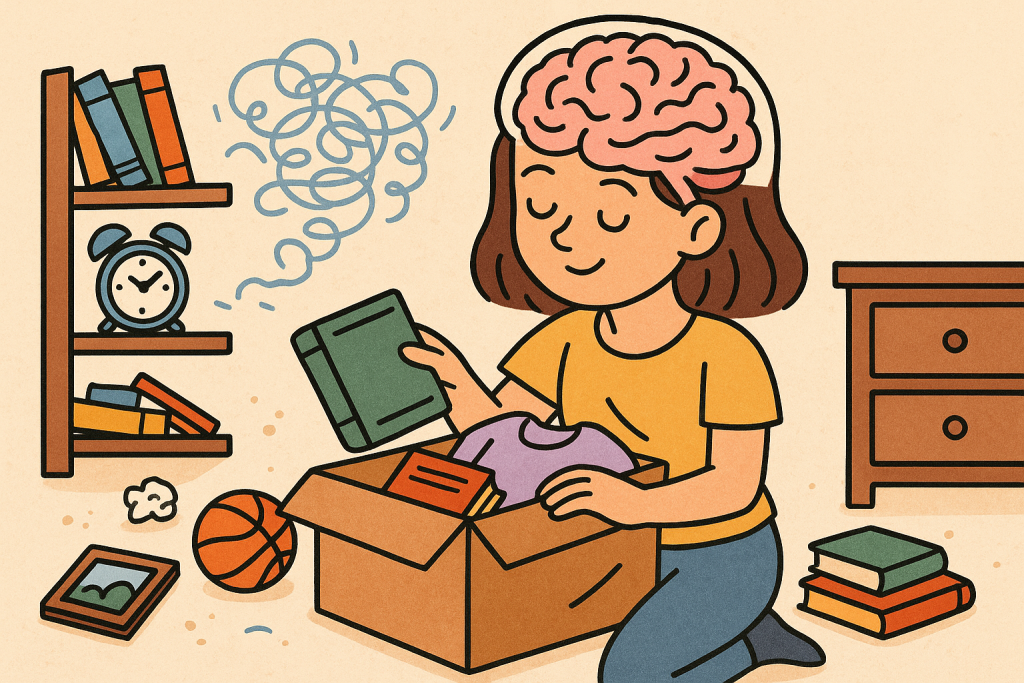Decluttering isn’t just about a tidy room—what happens to your brain when you declutter can spark real cognitive and emotional change. Explore the latest science and practical tips to clear your space and your mind.

1. Visual Clutter = Mental Overload
Your brain is wired to filter out distractions, but too much junk competes for limited mental attention. Studies show clutter acts like constant visual noise, draining your cognitive resources and impairing concentration. In one fMRI study, clearing clutter boosted prefrontal cortex activity, ramping up focus and decision-making power .
Another Princeton University study found multiple visual stimuli reduced working memory and cognitive performance.
2. Stress Hormones Drop
Clutter doesn’t just muddle your mind—it triggers a low-grade stress response. Messy environments raise cortisol levels, especially in parents living with clutter.
Once you clear the chaos, cortisol levels often drop by around 27%, easing tension and letting you breathe easier . That mental relief often leads to physical rest too, like better sleep.
3. Mood and Mental Health Improve
A cluttered home can amplify anxiety, depression, and even social withdrawal. Research links high-stress cluttered environments to feelings of shame, hopelessness, and emotional exhaustion.
Decluttering brings quick mood lifts—clearing rooms often sparks feelings of accomplishment, calm, and self-control .
4. Memory & Decision-Making Sharpen
Less clutter means your brain isn’t distracted by unnecessary stimuli. As a result, memory and decision-making become sharper.
One blog explained that clutter slows down retrieval—searching for misplaced keys or documents burdens your brain.
Another noted organized spaces reduce “mental triage,” freeing up resources to remember, analyze, and act more efficiently.
5. Creativity & Productivity Surge
Decluttered spaces are productivity gold. Research estimates organized environments can boost productivity by up to 77%.
Clean, minimal spaces encourage idea flow and reduce cognitive fatigue. Your brain spends less time filtering distractions and more time on creative, meaningful tasks.
6. The Neuroplasticity Effect
Decluttering doesn’t just help temporarily—it rewires your brain. Our brains are plastic: they adapt to our environment.
Psychology today references neuroplasticity interventions through space organization. Decluttering isn’t just cleaning—it’s forming healthier neural habits that support long-lasting change.
7. Digital & Emotional Declutter
Physical decluttering often leads to mental clarity. Just as clearing space on your desk improves workflow, decluttering thoughts (journaling, meditation) helps reduce mental chatter and stress .
Neuroscience shows deliberate thought practices—and by extension, decluttering—can reduce automatic negative loops and strengthen cognitive flexibility .
Trending Now: Mindful Minimalism
Minimalism has surged, especially as people look for mental clarity amid digital overload. A recent piece noted minimalism helps the brain lower cortisol levels, sleep better, and create intentional space for happiness .
Watching decluttering videos is also trending: viewers experience real-time calm because seeing order interrupts stress-related brain responses.
A Practical Guide: Declutter Your Brain
Decluttering doesn’t have to be overwhelming. Here’s a step-by-step way to clear mental clutter while cleaning your space:
Step 1: Set a Tiny Goal
Start with 10 minutes or one drawer. Small wins create momentum .
Step 2: Categorize Rapidly
Use KC Davis’s simple categories: trash, laundry, dishes, items with a place, miscellaneous.
Step 3: Visual Before/After
Take photos. Seeing transformation boosts motivation and fuels continued success.
Step 4: Scan for Emotional Clingers
Acknowledge your attachments. Donate or discard anything “not serving you,” aligning with emotional wellness.
Step 5: Tidy Daily
Adopt habits like the “ten-second tidy.” It keeps clutter from piling up and preserves mental investment.
Step 6: Mind’s Cleanup
Journal before bed. Writing tasks or thoughts down helps declutter your mind and supports restful sleep .
Long-Term Gains: More Space, Better Brain
- Sharper focus: Less visual noise = more attention.
- Lower stress: Cortisol dips = calmer feelings.
- Improved mood: A sense of control boosts emotional health.
- Better memory: Organized environments ease recall.
- Stable routines: Daily habits reinforce neuroplastic benefits.
- Creative energy: Clear spaces fuel innovative thinking and productivity.
Final Thoughts
What happens to your brain when you declutter isn’t just anecdotal—it’s backed by neuroscience, stress reduction studies, and mental health research. By embracing small, consistent steps toward an organized life, you’re not just cleaning your home—you’re rewiring your brain for better focus, calm, and long-term wellbeing.
Start small, stay consistent, and watch your mind and space transform together.
References
Sorrell, J. M. (2020). Tidying Up: Good for the Aging Brain. Journal of Psychosocial Nursing and Mental Health Services, 58(4), 16–18. https://pubmed.ncbi.nlm.nih.gov
Beckwith, A. & Parkhurst, E. (2022). The Mental Benefits of Decluttering. Utah State University Extension. Published July 1, 2022. https://extension.usu.edu
Travers, M. (2023). Why Decluttering Your Home Can Lead to Increased Brain Power. Psychology Today, updated September 22, 2023. www.psychologytoday.com






